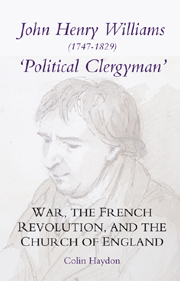 John Henry Williams (1747–1829): 'Political Clergyman'
John Henry Williams (1747–1829): 'Political Clergyman' Book contents
- Frontmatter
- Contents
- Dedication
- Illustrations
- Preface and Acknowledgements
- Abbreviations
- Editorial Note
- 1 The Grave and the Memory
- 2 The Formative Years
- 3 The Ivy-mantled Tow'r: Parish and Pastoralia
- 4 The Gathering Storm
- 5 By Far the Heaviest of All Earthly Calamities: Williams' Anti-War Sermons
- 6 Anxiety, the 1797 Campaign, and Afterwards
- 7 Assessment
- Bibliography
- Index
- STUDIES IN MODERN BRITISH RELIGIOUS HISTORY
5 - By Far the Heaviest of All Earthly Calamities: Williams' Anti-War Sermons
Published online by Cambridge University Press: 12 September 2012
- Frontmatter
- Contents
- Dedication
- Illustrations
- Preface and Acknowledgements
- Abbreviations
- Editorial Note
- 1 The Grave and the Memory
- 2 The Formative Years
- 3 The Ivy-mantled Tow'r: Parish and Pastoralia
- 4 The Gathering Storm
- 5 By Far the Heaviest of All Earthly Calamities: Williams' Anti-War Sermons
- 6 Anxiety, the 1797 Campaign, and Afterwards
- 7 Assessment
- Bibliography
- Index
- STUDIES IN MODERN BRITISH RELIGIOUS HISTORY
Summary
Fast and Thanksgiving Days
When he received the instructions for the 1793 fast day, Williams no doubt wondered whether he would be asked to bow the knee to Baal on just that one occasion. Despite the Younger Pitt's sanguine prediction that the war would be short, it is likely that Williams was pessimistic about the conflict's duration. The century after the Glorious Revolution had been punctuated by lengthy wars: the War of the League of Augsburg (1689–97); the War of the Spanish Succession (1702–13); the War with Spain/of the Austrian Succession (1739–48); the Seven Years' War (1756–63); and the War of American Independence (1775–83). The wars with revolutionary and Napoleonic France were to last from 1793 to 1802 and from 1803 to 1815, and although, in 1793, Williams could not have foreseen how titanic the struggle would prove, he probably anticipated successive calls to justify government policy from the pulpit. The alliance of the Church of England and the state was firm; and the Church's Thirty-Seventh Article – ‘Of the Civil Magistrates’ – explicitly stated, inter alia, that it was ‘lawful for Christian men, at the commandment of the Magistrate, to wear weapons, and serve in the wars’.
During the earlier wars of the eighteenth century, and at the time of the Jacobite risings of 1715 and 1745, the Church of England had held special services, like that decreed in 1793. At them, the clergy emphasized that God intervened directly in the world: He not only shaped the lives of individuals but also raised and pulled down nations at His pleasure.
- Type
- Chapter
- Information
- John Henry Williams (1747–1829): 'Political Clergyman'War, the French Revolution, and the Church of England, pp. 91 - 114Publisher: Boydell & BrewerPrint publication year: 2007


